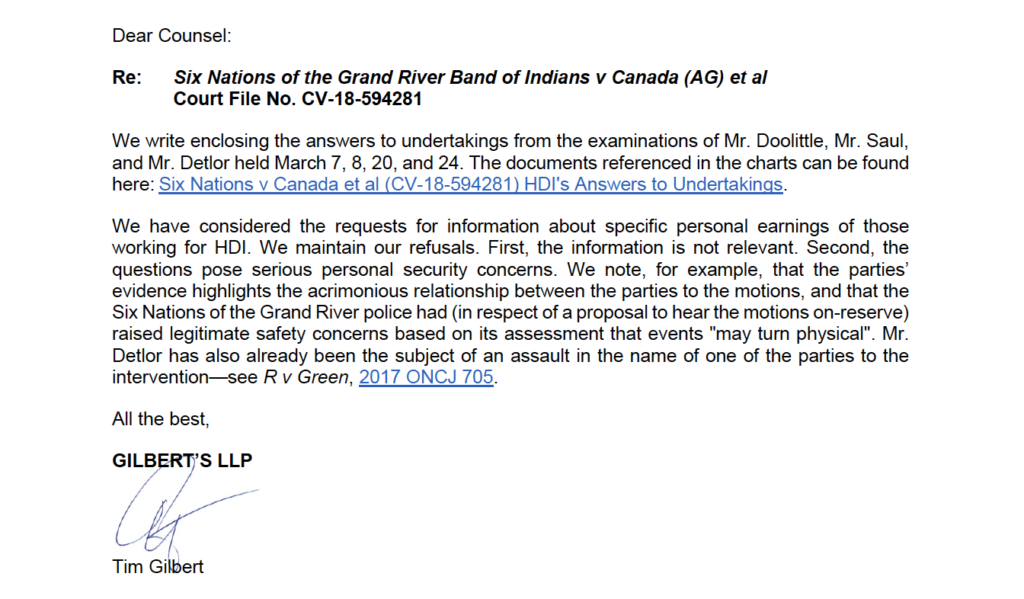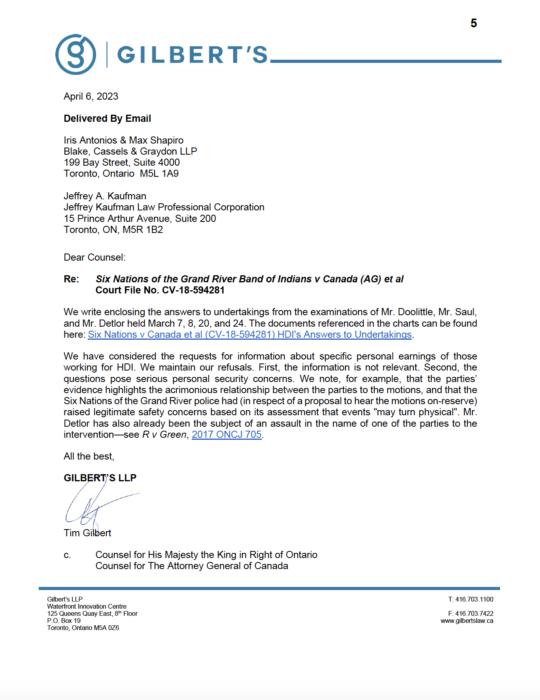
TORONTO — The lawyer representing the Haudenosaunee Development Institute is refusing to disclose specific financial information to the courts as part of HDIs motion to intervene in Six Nations land claim – including any details on success fees or salaries earned by those who work for HDI.
In a letter, HDI lawyer Tim Gilbert says that while they considered disclosing details on the “specific personal earnings of those working for HDI” they refuse to disclose those details to the court.
Gilbert says the information about money earned by HDI staff is “not relevant” to the organizations motion to intervene in Six Nations land claim and that if they were to do so — there would be “serious personal security concerns”.
Gilbert says that because the Six Nations Police had security concerns about hearings to be held on the reserve, and because Detlor was apprehended and carried out of the Six Nations GREAT building by the Men’s Fire in 2015, that he was refusing to disclose the dollar amounts and earnings for specific individuals who work for HDI.

Gilbert also refused to disclose the total dollar value of all money paid to HDI for projects they are involved in and refused to produce all of the financial statements of HDI.
While the HDI did supply some financial statements they would not disclose if the statements submitted were the totality of all financial statements in their possession and refused to supply all financial statements they have access to.
When HDI Director/lawyer Aaron Detlor was cross-examined and asked about the total money received by HDI in respect of projects they are involved in, HDIs lawyer Tim Gilbert objected saying the information was irrelevant.
When Detlor was asked how much of HDIs total project income has gone towards land rights issues Gilbert again objected and said the question was “onerous and not relevant to the action.”
“This is not a discovery. It is not a forensic audit of HDI,” said Gilbert.
Other revelations in the court documents show HDI has submitted a change to their original motion to intervene and is now asking a provincial judge to issue an order appointing HDI to represent the Haudenosaunee Confederacy Chiefs Council as well as all citizens of the Haudenosaunee Confederacy in Six Nations land claim.
Previously, the HDIs motion did not ask a foreign court to appoint them representatives of the HCCC.
The motion has changed to omit a claim that the Six Nations of the Grand River Band of Indians “lacks standing” to represent the people of Six Nations and has not demonstrated that it has any authority to represent the people of Six Nations.
Instead, the HDI have refined their motion to claim there are two separate and distinct peoples at Six Nations — a body of members who are governed by the band council and a separate body of members who are governed by the HCCC — and they are asking a foreign court to appoint HDI as the representative for both the HCCC and it’s citizens.
“The present circumstances necessitate and make desirable an order that HDI be appointed representative (as delegated by the HCCC) of the HCCC and of the Haudenosaunee Confederacy and its citizens in the Action,” reads the motion.
Additional changes include the removal of an affidavit from HCCC Secretary Leroy Jock Hill that was expected to be added to their materials, but was previously not attached to the motion to intervene.








